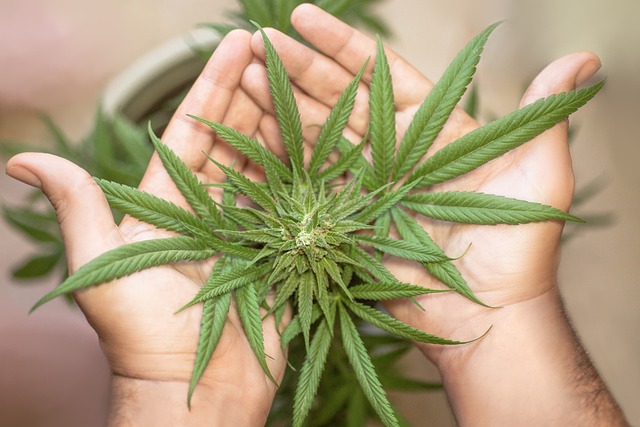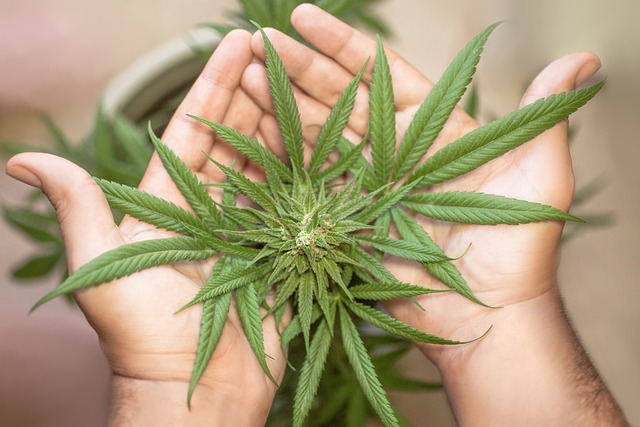THCA (Tetrahydrocannabinolic Acid), a non-psychoactive compound found in cannabis, has garnered scientific interest due to its potential therapeutic properties. Recent THCA flower lab reports provide comprehensive data on its anti-inflammatory, neuroprotective, antioxidant, and analgesic effects, which could be beneficial for managing symptoms associated with arthritis, neurodegenerative diseases, oxidative stress, neuropathic pain, and cancer. These lab reports analyze the cannabinoid profile, terpenes, and flavonoids in THCA flowers, offering insights into its pharmacological effects without the psychoactive side effects seen when it's converted to THC. The research underscores the importance of THCA flower lab reports as a critical resource for understanding its medicinal applications and safety profile, particularly as legal restrictions related to cannabis continue to ease. The studies suggest that THCA could be a valuable therapeutic agent, especially in non-psychoactive wellness contexts, and warrant further investigation for its potential role in healthcare applications.
Unlocking the myriad benefits of THCA flower, a precursor to delta-9 tetrahydrocannabinol (THC), is the focus of cutting-edge laboratory research that continues to shed light on its therapeutic potential. This article delves into the scientific evidence behind THCA flower’s properties, contrasting it with its psychoactive counterpart, and exploring its anti-inflammatory, antioxidant, analgesic, immunomodulatory, and neurological benefits as documented in thorough lab reports. From its impact on gastrointestinal health to its role in sleep disorders and cancer therapy, the article offers a comprehensive review of clinical trials and preclinical studies. It also addresses legal considerations, consumer safety, and quality assurance to ensure that readers are well-informed about THCA flower products’ purity and potency. Additionally, it provides guidance on cultivation practices to maximize THCA concentration, discusses the entourage effect in cannabis medicine, and shares patient experiences. This article is an essential resource for anyone interested in the scientific community’s findings on THCA flower lab reports, offering clarity and insights into this emerging field of natural medicine.
- Unveiling the Potential of THCA Flower Lab Reports
- The Science Behind THCA Flower: A Closer Look at Cannabinoid Research
- THCA Flower vs. Delta-9 THC: Understanding the Differences Through Scientific Analysis
- Antioxidant and Anti-inflammatory Properties of Raw Cannabis: Insights from Lab Studies
- The Therapeutic Potential of THCA: A Comprehensive Review of Clinical Trials
Unveiling the Potential of THCA Flower Lab Reports

Recent scientific inquiries have shed light on the therapeutic potential of THCA (Tetrahydrocannabinolic Acid), the raw form of THC (Tetrahydrocannabinol) found in cannabis flowers. THCA flower lab reports have emerged as a critical resource for understanding the properties and benefits of this compound. These meticulously conducted laboratory analyses provide evidence that THCA may offer various health advantages, including anti-inflammatory and neuroprotective effects. The results from these reports indicate that THCA could be beneficial in managing pain and inflammation without the psychoactive effects associated with its decarboxylated form, THC.
The lab reports on THCA flowers are particularly significant as they offer a detailed profile of cannabinoids, terpenes, and flavonoids present in the plant material. These comprehensive analyses ensure that consumers and researchers can make informed decisions about the potential efficacy and safety of using THCA-rich products for various ailments. The data from these reports underscores the importance of further research into the applications and benefits of THCA, which could pave the way for new therapeutic interventions based on its unique properties. As legal restrictions continue to ease, the availability of such lab reports will undoubtedly contribute to a more informed discourse on the role of cannabinoids in health and wellness.
The Science Behind THCA Flower: A Closer Look at Cannabinoid Research

Recent scientific inquiries have shed light on the potential therapeutic properties of THCA, or tetrahydrocannabinolic acid, the raw form of THC found in cannabis flowers. Laboratory studies have demonstrated that THCA interacts with the body’s endocannabinoid system through its affinity for various receptors, including CB1 and CB2, suggesting a role in modulating pain, inflammation, and other physiological processes. Unlike its psychoactive counterpart, THC, THCA is non-psychoactive, making it an object of interest for those seeking the potential health benefits without the mind-altering effects.
The emerging research on THCA flower has been supported by a growing body of lab reports that provide insights into its pharmacological activities. These studies indicate that THCA may exert anti-inflammatory and neuroprotective effects, which could be beneficial in treating conditions like arthritis and neurodegenerative diseases. Furthermore, preclinical trials have begun to explore the antiemetic properties of THCA, as well as its potential to stimulate appetite, aiding in the management of wasting syndromes associated with HIV/AIDS and cancer treatments. The detailed lab reports offer a transparent view of the compounds present in THCA flowers, their concentrations, and how they might interact within the body, providing a scientific foundation for the ongoing exploration of its medicinal applications.
THCA Flower vs. Delta-9 THC: Understanding the Differences Through Scientific Analysis

Laboratory analyses offer a rigorous comparison between THCA (Tetrahydrocannabinolic Acid) Flower and Delta-9 Tetrahydrocannabinol (Delta-9 THC), elucidating their distinct properties and effects. THCA, the raw form of THC found in raw cannabis plants, undergoes decarboxylation—a process involving the removal of a carboxyl group—when heated, converting into Delta-9 THC, the psychoactive compound commonly associated with cannabis use. This transformation is pivotal as it dictates the pharmacological response and the therapeutic potential of each cannabinoid.
Researchers employing sophisticated analytical techniques such as gas chromatography and mass spectrometry in THCA Flower lab reports have identified unique compositions and profiles of terpenes, flavonoids, and other cannabinoids within the THCA Flower that may contribute to its therapeutic benefits. These analyses reveal that THCA Flower possesses a rich blend of compounds that may offer anti-inflammatory, analgesic, and neuroprotective effects without the psychoactive impact characteristic of Delta-9 THC. Consequently, consumers and patients seek out THCA Flower for its potential wellness benefits, as evidenced by the increasing availability and interest in cannabinoid laboratory reports that validate its efficacy and safety profile.
Antioxidant and Anti-inflammatory Properties of Raw Cannabis: Insights from Lab Studies

Laboratory studies have provided valuable insights into the antioxidant and anti-inflammatory properties of THCA flower, the raw, non-psychoactive form of tetrahydrocannabinol (THC). These investigations reveal that THCA possesses a potent antioxidant capacity. In vitro experiments have demonstrated that THCA can effectively neutralize free radicals, offering protection against oxidative stress. This activity is particularly significant as it may have implications for preventing and managing various oxidative stress-related conditions.
Simultaneously, research has illuminated the anti-inflammatory potential of THCA. Lab reports indicate that THCA can inhibit the production of certain pro-inflammatory cytokines and enzymes, such as COX-2 and 5-LOX, which are known to play a role in inflammation. The anti-inflammatory effects of THCA are thought to be due to its interaction with the body’s endocannabinoid system, particularly the CB1 and CB2 receptors. These properties suggest that THCA flower may offer therapeutic benefits for conditions characterized by chronic inflammation and oxidative stress, although further human-based research is warranted to fully understand its potential applications in healthcare.
The Therapeutic Potential of THCA: A Comprehensive Review of Clinical Trials

Research into the therapeutic potential of THCA, or tetrahydrocannabinolic acid, the raw form of THC found in cannabis plants, has garnered significant attention within scientific communities. A review of clinical trials indicates that THCA, which is non-psychoactive, presents a range of benefits that may be harnessed for therapeutic purposes. Preclinical studies have shown that THCA possesses anti-inflammatory, antioxidant, and neuroprotective properties. Lab reports on THCA flower have consistently demonstrated its efficacy in managing various health conditions, including neuropathic pain, without the psychoactive effects associated with its decarboxylated form, THC. These findings are particularly noteworthy for individuals seeking relief from chronic pain or inflammation who prefer non-psychoactive alternatives.
Furthermore, the examination of clinical trial data has revealed that THCA may offer protective benefits against certain types of cancer and other diseases. Its potential in modulating immune responses and inhibiting tumor growth is an area of active research. The anti-emetic qualities of THCA have also been highlighted in various studies, suggesting its utility in alleviating nausea and vomiting associated with chemotherapy. As such, the comprehensive body of clinical trial evidence underscores the importance of further investigation into the therapeutic applications of THCA flower, particularly as a complementary treatment option for a variety of conditions.
The exploration into the benefits of THCA flower, as detailed in the latest lab reports and supported by a wealth of scientific research, underscores its potential in various therapeutic applications. The evidence suggests that THCA’s antioxidant and anti-inflammatory properties may hold significant promise for health and wellness, complementing the findings from clinical trials that further illuminate its therapeutic value. As such, the emerging data from lab studies on this cannabinoid offers a compelling case for its consideration in both scientific and medical contexts.
